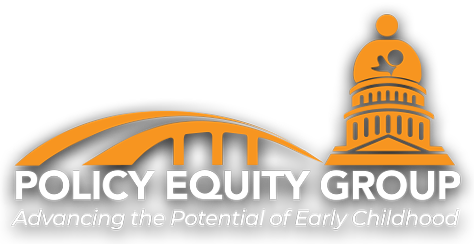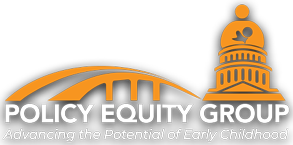Who We Are
Perhaps the best advice we received when starting our organization was: “You have to know your why.” Everyone should have a core story that drives them. We wanted to share ours.
Kelly Etter, Ph.D.
Like many children, I spent a lot of time during my formative years at a child care center—though I was often under a desk in the front office. My mom’s job as the director of a child care program seemed glamorous to me, her workplace a child’s utopia designed for play and discovery, filled with adults who were genuinely interested in children. On evenings and weekends while she worked, I roamed the empty classrooms and on days I wasn’t in school, I sat quietly drawing or reading under her desk. It was here that I learned what child care is like for grown-ups. Into my mom’s office, families and staff brought concerns and celebrations around children’s development, their personal and financial problems, and a fierce passion for doing right by the children in their care. Amidst the joy and struggle paraded through her office every day, I watched my mom unwaveringly support every person who walked through the door. Though I didn’t fully understand this at the time, I internalized that raising children is a shared responsibility among many people that is both complicated and critical.

Years after I left the space under my mom’s desk, I found other ways to explore the early childhood world. I haunted the developmental psychology sections of the libraries of Middlebury College and UC Berkeley where I did my undergraduate and graduate studies. I spent late nights in basement research labs analyzing data about parent–child book reading behaviors and the effects of relationship-based professional development for preschool teachers. I walked the marble halls of policymakers’ offices, advocating for early education during my time as a research and public policy associate at Teaching Strategies in Washington, DC. I’ve sat at tables with teachers and parents in my role as a school psychologist and early childhood mental health consultant and I’ve spent countless hours crouched down on the floor as a teacher, child therapist, and parent. When I look at all these experiences woven together, the thread that stands out most is the looming gap between what we know is possible when children are supported to their full potential and the stark realities for many children and the adults who matter most in their lives.
Through my journey across roles and time, I’ve been frustrated in a thousand different ways about how systems fail children, families, and educators. In my current work, I have the opportunity every day to try to reimagine these systems to transform thinking and practice. Like a series of dominoes, even the biggest changes in systems and policies are the result of small changes in the beliefs and behaviors of many people. So for every endeavor I take on, I ask myself, “What do I want to see change as a result of this work? What can I learn from those ‘living’ the early childhood system?” I wonder how a proposed change might affect teachers or parents I’ve worked with. What would the state administrator who works tirelessly to promote equity ask me to include? I conjure up the faces of the babies and preschoolers I’ve worked with and try to envision how this work might have made a difference for them. I ask myself, “What would my mom think?”

